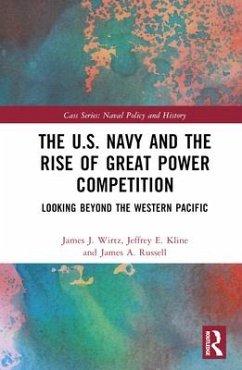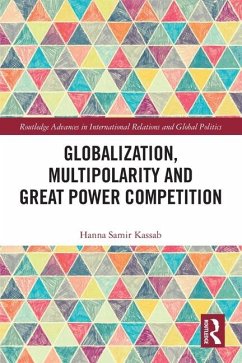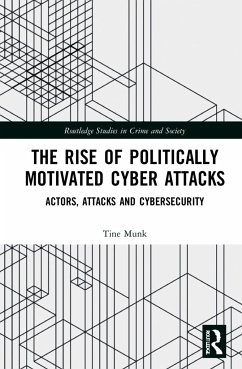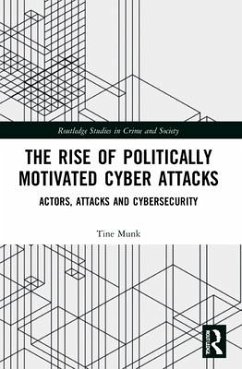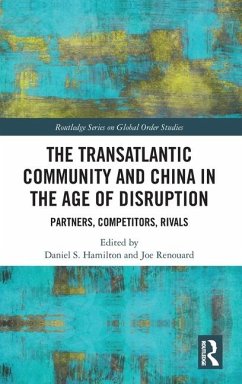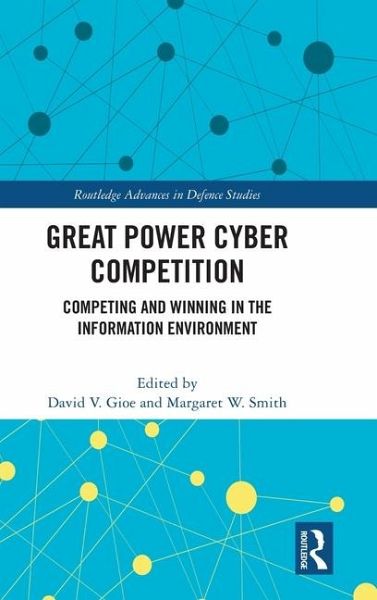
Great Power Cyber Competition
Competing and Winning in the Information Environment
Herausgegeben: Gioe, David V.; Smith, Margaret W.
Versandkostenfrei!
Versandfertig in 6-10 Tagen
154,99 €
inkl. MwSt.

PAYBACK Punkte
77 °P sammeln!
This volume conceptualizes the threats, challenges, opportunities, and boundaries of great power cyber competition of the 21st century.This book focuses on a key dimension of contemporary great power competition that is often less understood due to its intangible character: the competition taking place in the cyber domain, including information and cyber operations. Democracies across the globe find themselves in an unrelenting competition with peer and near-peer competitors, with a prevailing notion that no state is "safe" from the informational contest. Adversarial powers, particularly China...
This volume conceptualizes the threats, challenges, opportunities, and boundaries of great power cyber competition of the 21st century.
This book focuses on a key dimension of contemporary great power competition that is often less understood due to its intangible character: the competition taking place in the cyber domain, including information and cyber operations. Democracies across the globe find themselves in an unrelenting competition with peer and near-peer competitors, with a prevailing notion that no state is "safe" from the informational contest. Adversarial powers, particularly China and Russia, recognize that most competition is principally non-kinetic but dominates the information environment and cyberspace, and the volume articulates the Russian and Chinese strategies to elevate cyber and information competition to a central position. Western governments and, in particular, the U.S. government have long conceived of a war-peace duality, but that perspective is giving way to a more nuanced perception of competition. This volume goes beyond analyzing the problems prevalent in the information space and offers a roadmap for Western powers to compete in and protect the global information environment from malicious actors. Its genesis is rooted in the proposition that it is time for the West to push back against aggression and that it needs a relevant framework and tools to do so. The book demonstrates that Western democratic states currently lack both the strategic and intellectual acumen to compete and win in the information and cyber domains, and argues that the West needs a strategy to compete with near-peer powers in information and cyber warfare.
This book will be of much interest to students of cyber-warfare, information warfare, defense studies, and international relations in general, as well as practitioners.
This book focuses on a key dimension of contemporary great power competition that is often less understood due to its intangible character: the competition taking place in the cyber domain, including information and cyber operations. Democracies across the globe find themselves in an unrelenting competition with peer and near-peer competitors, with a prevailing notion that no state is "safe" from the informational contest. Adversarial powers, particularly China and Russia, recognize that most competition is principally non-kinetic but dominates the information environment and cyberspace, and the volume articulates the Russian and Chinese strategies to elevate cyber and information competition to a central position. Western governments and, in particular, the U.S. government have long conceived of a war-peace duality, but that perspective is giving way to a more nuanced perception of competition. This volume goes beyond analyzing the problems prevalent in the information space and offers a roadmap for Western powers to compete in and protect the global information environment from malicious actors. Its genesis is rooted in the proposition that it is time for the West to push back against aggression and that it needs a relevant framework and tools to do so. The book demonstrates that Western democratic states currently lack both the strategic and intellectual acumen to compete and win in the information and cyber domains, and argues that the West needs a strategy to compete with near-peer powers in information and cyber warfare.
This book will be of much interest to students of cyber-warfare, information warfare, defense studies, and international relations in general, as well as practitioners.





